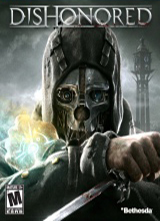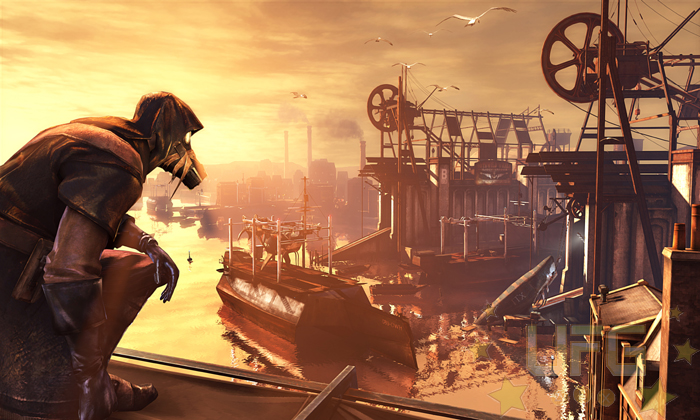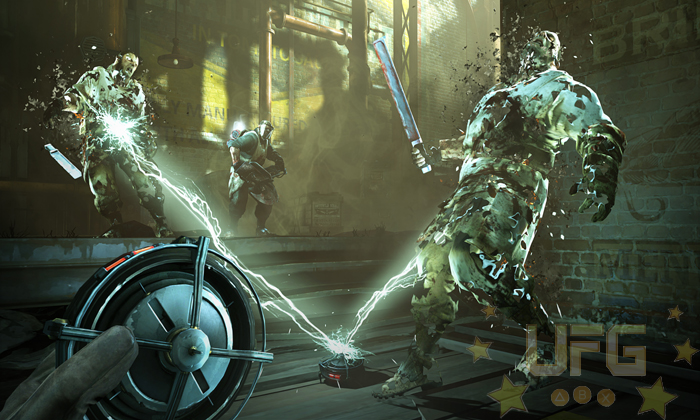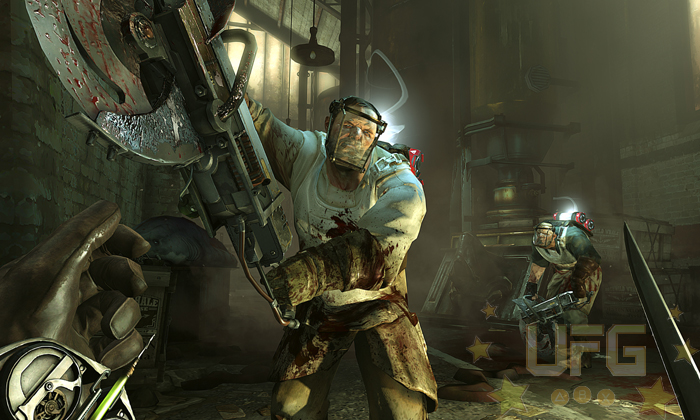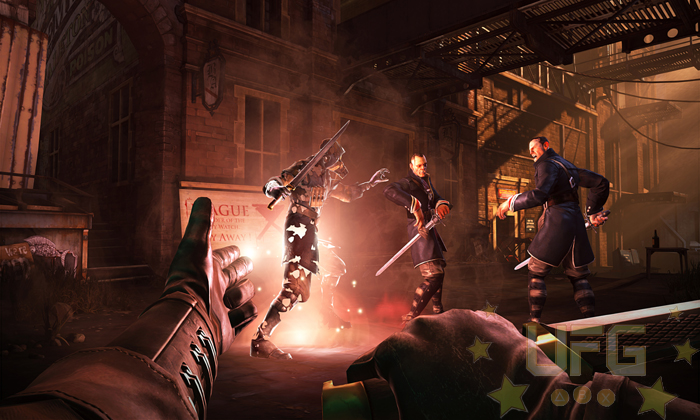Dishonored: The Knife of Dunwall
My first trip to Dunwall, was an amazing one to say the least. Seeing the rich world of Dishonored, intricately designed by Akrane Studios through the eyes of Corvo was a great experience. And though I’d never want to live there in real life, I relished the thought of heading back to that rat infested city via the Knife of Dunwall DLC. Unfortunately, my stay wasn’t nearly as enjoyable as it was the first time out.
Knife of Dunwall (KoD) follows the story of Daud, the leader of a band of assassins that were paid to kill the Empress Kaldwin in the main game. The premise revolves around the notion of redemption; apparently Daud felt guilty after killing the Empress. Normally he wouldn’t care who he killed, but this time things “felt different”. As doubt slowly creeps into his mind, moments after dealing the fatal blow, he is visited by the Outsider (a supernatural being). Daud, like Corvo, was marked by the Outsider, granting him supernatural powers. During this meeting the Outsider tells Daud that he could atone…or rather that he should atone for his actions least he face the consequences. He tells him that in order to do so, he must find out the significance of the name Delilah. This, of course, sets the tone for the rest of the game as Daud relentlessly hunts down any leads that will help in his quest to find Delilah (who or whatever it may be).
Now on paper this all sounds very interesting. Theoretically, we’ll get to see how a criminal deals with the aftermath of commenting a heinous act. The developers had an opportunity to tell an incredible story. I mean, the number of places a narrative could go from a premise like this is immense, especially when you consider that the game allows us to choose the outcome of most events leading to different conclusions. This fact alone made it so difficult to like this expansion. Nothing riveting or exciting…or even meaningful to the overarching story was derived from KoD!
In hopes of not spoiling exactly what happens, I’ll be somewhat vague. Again, the story revolves around Daud and his search for redemption. Most of the game was about sneaking into places, interrogating nasty individuals, searching for clues, and basically acting like Corvo the whole time. Though there are side missions that enhanced the story, most of the time was spent deciding the fate of a few people. For instance, one character who swore they knew a lot about Delilah would only give me information if I took out her greedy uncle. Searching around I was able to find two different approaches to this goal; one involved killing him, the other didn’t. Seeing as how this was about redemption and that raising the world’s chaos level wasn’t very redeeming, I opted for the less violent approach. The fates of the main “targets” seemed to be the way the game determined whether or not the gamer really wanted to change Daud’s behavior and ultimately the game’s ending. The problem I saw was that it didn’t really amount to anything in the grand scheme of things. Never did I once feel like there was any real progress being made towards the cleansing of Daud’s soul. The characters that accompanied me on this journey seemed to feel the same way.
Being the leader of a group of killers, it would be understandable if my choices seemed odd to the other mercenaries. Outside of a few characters commenting on how I (Daud) was changing and that maybe they had the wrong idea about me, no fuss was made. No one really seemed to care about it. Daud would narrate between levels about whom or what Delilah is and how she/it could help him get over his guilt. He’ll even talk about how Dunwall has gone to pieces after Kaldwin’s murder. So there is a somber tone there at least. But, other than that it seemed like business as usual. My choice of whether or not someone should live always felt inconsequential outside of that particular moment in time. To be fair, I only played as if I wanted to see a change in Daud; I’m sure the dialogue and scenes would have changed if I chose to lay waste to everything around me. But on the other hand, I feel that I shouldn’t have to play a certain way to get the most out of the story, especially when my way of playing is presented as a viable option. The game should be entertaining whether I chose to be a ruthless assassin or not, based on the hyped feature of being able to pick your path!
Then there is the last level. The way the story went from here to the end of the game…I don’t understand it at all. Again, I’m going to be vague. Somehow, Daud was able to ascertain exactly “what” Delilah was without any help from anything. I didn’t pick up any manuscripts filled with clues and none of the NPC’s mentioned what she was. Not even a lame, dialogue heavy exposition from Daud was given. All of sudden he just knows…Maybe there was a cutscene I missed or something I was supposed to find that would have given him that knowledge and the game decided to “fill” me in. Either way, there was a lot of confusion on my part. Pushing that aside, knowing her identity didn’t help at all; it didn’t lead to any revelations. There wasn’t anything new that would challenge who Daud was or could be. His change in lifestyle might have changed his fate, but that didn’t have much of anything to do with Delilah. There is a moment where you have to make another choice to let someone live or not, but that could have been accomplished without all of the running around. Seriously, what was the point of all this?
Please understand, I don’t need my hand held when going through a game. I also don’t need everything explained to me to get the general concept. What I do need is for a narrative-heavy game to refrain from forcing me to make weak assumptions in order to grasp at what the writer might have been thinking while developing the plot. A lacking narrative that results in the poor divulging of the most pivotal mystery in the whole story is inexcusable. Bottom line, KoD left me with an overall unsatisfied feeling that lasted way after the credits rolled. And though there is supposed to be another DLC add-on that starts where KoD left off, it doesn’t make me feel any better about what I just played!
Being that Dishonored is a very story-driven game, it would make sense for most of my enjoyment to come from the time I spend immersed within said story. That’s not to say that the core gameplay wasn’t good though. KoD features all of the trappings that made Dishonored a blast to play. Going further, Daud has a few extra tricks up his sleeve that makes him slightly more appealing to play as than Corvo. One such ability allows you to summon an assassin to fight for you. They can be sent to take out a particular person or to scope out an area, taking on all possible threats. What makes them cool, outside of the whole ninja vibe, is the fact that they have the same abilities as you do. They can blink (teleport) around the map and use windblast (think force push) at will. Also, when Bend Time is used, the spawned assassin keeps their normal speed; seeing your ally quickly dispatch armed guards after you’ve slowed down time is definitely a treat!
The gameplay wasn’t the only thing that made KoD worth talking about. Visually, Dishonored stood out from other titles when it released last year. KoD ups the ante a bit with the first level. Taking place inside of a slaughterhouse, we get to see just how cruel the job of whaling could be in Dunwall (before we only got descriptions). The butchers, a new enemy type, would saw off large chunks of meat from the whales while they were still alive. Apparently, keeping them alive during this process allotted for more whale oil. You can image what the inside of a place like this would look like. What’s to be noted is how everything is depicted. There isn’t a lot of gore just for the sake of shock value; it all fits in within this world. The mindset of the workers, the pain the animals felt, the way society works on certain levels; a lot of information can be gleamed from just looking around.
All and all, KoD is a serviceable DLC add-on. The story left me wanting but the gameplay itself was fantastic, mainly because it featured a lot of what made Dishonored fun in the first place. Even so, I didn’t enjoy my overall experience. Again, a lot of the appeal came from the cool premise; I really wish more work went into telling a meaningfully story as opposed to trying to invoke wonder and mystery. Here’s hoping that the next add-on is more of a complete thought and less of a bunch of nice sounding words!
Gameplay:
6
Knife of Dunwall is great in terms of actual gameplay but it falters when it comes to the story.
Graphics:
10
Arkane Studios visually created an awesome world to explore.
Sound:
10
The voice acting is top notch. The music fits the narrative; creating an overall “mood” to the events on screen. Basically, it’s just like the main game!
What's New:
5
There isn’t a whole lot new here outside of a few new tricks and a different perspective.
Replay Value:
4
I truly had no desire to replay KoD once the credits rolled. The story didn’t lend itself enough to that want. That said, there is always a different path that could possibly lead to a different outcome.
Final Score:
7
